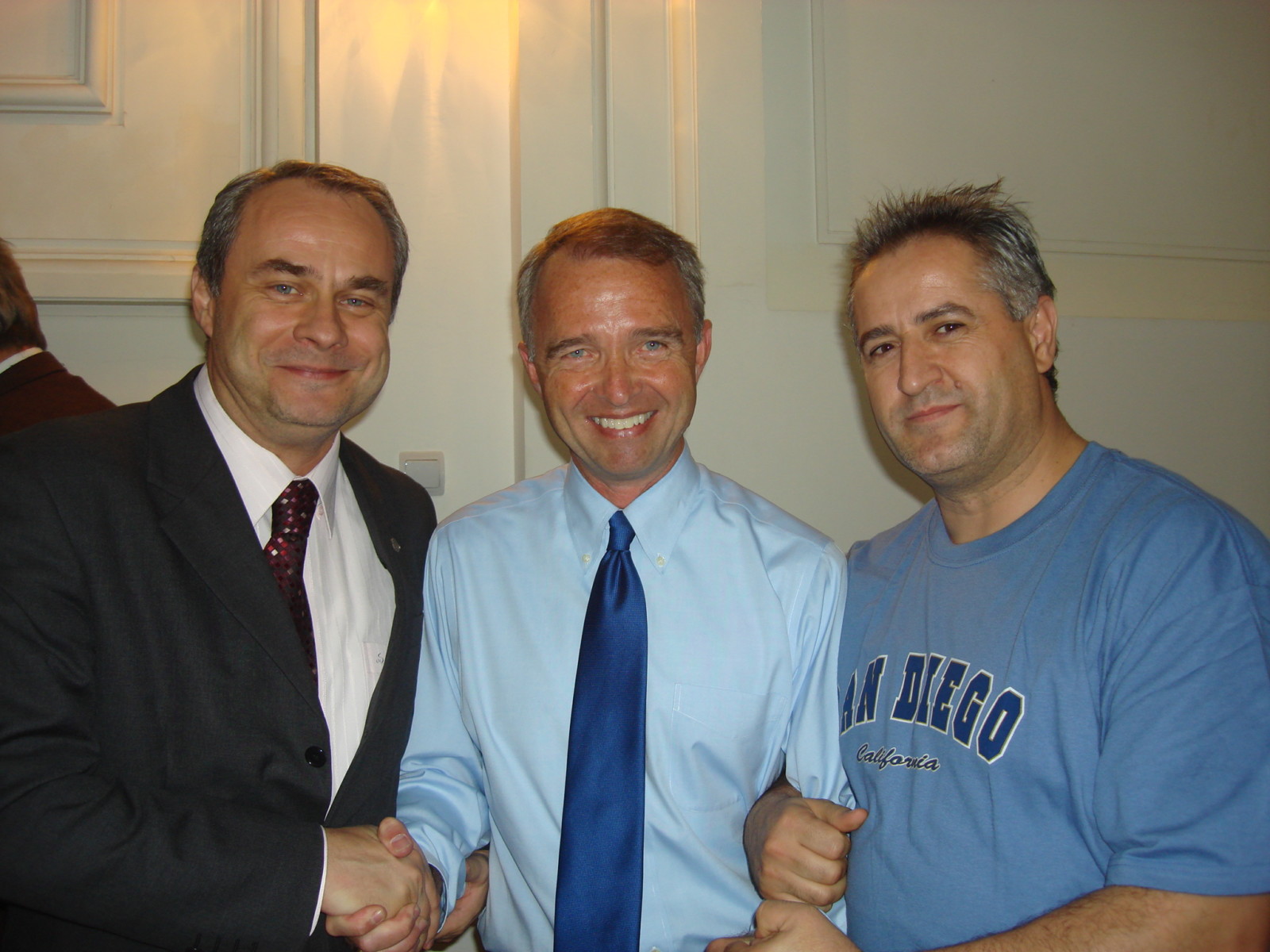
In Conversation With George Hardy
Stories from the Director of the SDDC Advisory Board
We could not think of a better member of our community to highlight on International Volunteer Day than George Hardy.
As Chair of the San Diego Diplomacy Council’s Advisory Board and former Board of Director, George is an integral part of our operations and community. Having served on our Board of Directors for six years prior to his involvement with the Advisory Board, George is very familiar with our mission and values. We are incredibly thankful for his ongoing support – the majority of which happens away from the eyes of our community.
Please enjoy this discussion with George Hardy as we hear more about his experience as a US attorney, international experiences, and SDDC memories.
Lulu Bonning: George, thank you so much for chatting with me. It’s very exciting not only for me because I have heard many very excellent things about you, but also to share a bit more about you with our fantastic community. You have been a part of it for quite a while, so I’ve been told. How did you first hear about the Diplomacy Council, and what made you decide to invest yourself in it?
George Hardy: I first reached out to the Diplomacy Council in 2012 when I retired from the Justice Department. I was an assistant US attorney for most of my career. Throughout my career, I had dealt with the U.S Department of State’ sponsored International Visitor Leadership Program (IVLP). As groups would come to town, occasionally I would be asked to be involved with briefing some international visitors, and I always enjoyed doing that. The last five or so years of my career, I did a lot more international work and really got to enjoy that experience. So, when I retired, I really wanted to maintain that connection with international work. I went to visit Catherine DeStefano who was the Executive Director [of SDDC], and back then, your offices were on 30th street, and I live in North Park, so it was just up the way. It seemed like a natural fit. I walked in and said, ‘Hi, can I help? What can I do?’ She said, ‘do you want to join the board?’ and I said, ‘sure.’ So I joined the Board. I was on the Board for six years and then got involved with the Advisory Board.
LB: Wow, ok, so it was quite a natural progression from the sounds of it. You mentioned you had some international interest thanks to your career, but from what I’ve heard about you, you’ve had many other international experiences besides and have lived in other countries. Do you think that had an influence on you then getting into international law? How did that play out in other aspects of your life as well?
GH: I was born in Louisiana. My dad was in the Air Force, and was Commander of the 3rd Air Force. He had a very long and distinguished career, and I trailed along as a kid, with my two older siblings. But I spent all four years of high school in Europe. [My dad] was stationed in England as the Commander of the US Cleared Air Force which was the main military command in the UK at the time. Then, he got his third star – he was a three-star General – and became the Commander of Allied Air Forces of Southern Europe and we lived in Naples, Italy for two years. That’s where I graduated from high school. So I had all four years of my high school in Europe and never returned to the United States during that period.
These days, people flit back and forth across the pond all the time, but, no, I was there. The whole idea of the United States was foreign to me after those four years. When I came back and went to Yale as an undergraduate, I very quickly decided that International Relations was the field I wanted to focus on. So that’s what my degree was in. I toyed with the State Department, foreign service, but I don’t know what happened to me, I decided to become a lawyer instead. It turned out alright, though.
.
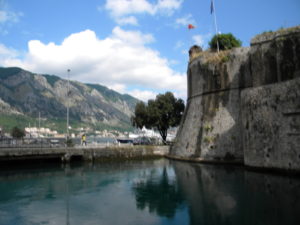
2009 trip to Montenegro to participate in an analysis of the judicial system for the US Department of State
LB: From the sounds of it, it did! As you mentioned, the high school years are pretty pivotal when growing up, and quite an interesting time to be pulled away from the country that you were born in and that’s home to everything you’ve ever known. Do you see that as a positive or a negative?
GH: Oh, an absolute positive. I loved moving around with my family. We were a very close family and every day was an adventure. In retrospect, some of the places we lived might be considered boring places, but we also lived in some very exciting places and every time we moved someplace, my parents were particularly good at instilling excitement about where we were. We were in Tucson, Arizona in the ‘50s and it was exciting being near the Mexican border and going down and getting food – although, I hardly remember that. I was very, very young. But we’d go up to the Grand Canyon and see everything around Arizona. Then, we spent a lot of time in the Washington, D.C. area, as you can imagine with the Pentagon there, my dad was there a lot. We were in Hawaii in the late ’50s, I was there when it became a State
LB: Wow!
GH: Hawaii was very different back then. It was not as crowded, it was easy to get around, and as a little kid learning to swim and surf – well, kind of, I wasn’t very good. And in the excitement of this territory becoming a state, it put you into a broader perspective than just your local community. Then, of course, being in Europe later. So, yes, I loved moving around.
LB: So, I’m just trying to get your timeline straight, because it sounds like you did a lot of moving. So you were born in Louisiana, you spent time in Arizona, spent time in D.C. and then Hawaii, before going to Europe?
GH: Hawaii for three years, that was ‘57 to ‘60, then we were actually in Biloxi, Mississippi. I was, what, 10, 11, 12, 13 there so it was Boy Scout time and all those kinds of things. Though it was a very… you know, at the time it didn’t hit me quite that hard. In retrospect, it’s really quite profound.
When I was there, Mississippi was segregated. I went to a segregated school, even though the military base that my dad was a commander of was totally integrated. It never dawned on me, [as] an 11-year-old boy and in Cub Scouts, but I remember being struck really powerfully when I was trying to sell tickets to a Boy Scout Jamboree. I remember walking around the military neighborhood where we lived and selling tickets in my little uniform, knocking on the door.
‘Hello, would you like to buy some tickets?’
I remember going to this one home and this lovely African American lady opened the door and said, ‘hello dear, how are you?’
I said, ‘oh, fine, how are you doing? Would you like to buy a ticket for our Boy Scouts Jamboree?’
She looked at me, and she said, ‘well dear, where’s it being held?’
I said, ‘it’s downtown, at the high school football stadium.’
She said, ‘you know, we can’t go there.’
It hit me like a ton of bricks. So even though this was a small town, not a world capital, not international, but what a lesson.
Then, of course, when I was in London for two years there was a lot going on. Winston Churchill died when I was there. I remember my mother pulling me out of school to go stand in line to pay respects to Winston Churchill when he was lying in state at Westminster Hall. We must have waited for 6, 7 hours in a line of mostly Brits who were all very serious, very contemplative. It made a huge impression on me as well.
LB: Wow. You really integrated yourself into the British lifestyle and saw the figures of importance – I mean, Churchill is a world-renowned leader of course – but that’s a big commitment to show your respects and wait in line for that long for him.
GH: It was. And it was something that my parents made possible. They love people, they love international life. My dad maintained friendships when he was stationed in England during WWII. He maintained those friendships and we were in touch with a lot of those people when we were living there in the ‘60s. It made for a wonderful experience.
.
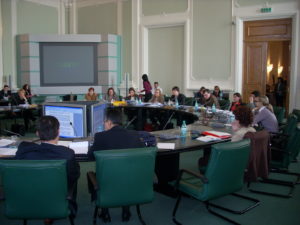
At an early negotiation with 12 participating countries renegotiating the SECI Treaty. George was the only English speaker.
LB: That’s awesome. I’m sure you too have made friends in many corners of the world. How do you maintain those friendships and connections when you can’t necessarily see everyone or entertain everyone – or even have the time or brainpower to actually maintain those social connections?
GH: Well, obviously it’s so much easier today than it used to be. When my sister went off to college, we were living in England. I didn’t see her or talk to her or have any connection with her for the entire school year. Today, I’m on Whatsapp every day with friends all over the globe. It’s the easiest thing in the world to stay in touch. I like to travel, so I make a point of trying to plan my travel around seeing friends. It makes it so much more enjoyable and meaningful.
I made a friend through the IVLP, and through the Diplomacy Council who is North Macedonian. I went and visited him last summer in Skopje, which was great fun, talking to him about what’s going on politically. My interest is more in rule of law because that’s what I did professionally. I was stationed in Bucharest, Romania as the US representative at an international law enforcement agency called the SECI Center. It’s now changed its name and is called SELEC. This was a platform for law enforcement cooperation among 12 countries in Southeast Europe and its police and customs that had representatives at this one facility on the top floor of Ceausescu Palace in Romania, which is also the parliament building where I worked. The idea was to get these folks to stop shooting each other. This was post-Balkan wars and the collapse of Communism and trying to get to know each other across these difficult lines.
LB: So you were there in the late ‘90s?
GH: I was there in 2004 – 2009. The wall came down in 1989 and a lot of those countries scrapped their Communist systems, but it took a long time for those countries to start building their institutions towards being compliant with EU requirements, because they all wanted to get into the EU. That was the driving force – that they had to comply with the requirements in the Acquis, which is the checklist of things for countries who want to become part of the EU. So it involved changing their laws and then functioning differently. The United States was encouraging that process but also trying to encourage a slightly more practical rendition of it. That’s what I was doing. But I got to travel extensively. Every week, I was going someplace. I’d have a meeting with police or customs, or I’d give a talk, then I’d have time off to meet people on Lonely Planet guide walking tours. I’d start going around and meeting people. Then, I’d go to other places where I didn’t have a meeting so I really had a chance to get to know the area. It was a great experience.
LB: That’s fantastic! What are some of the highlights from that time?
GH: Gosh, there are so many. One trip that comes to mind was a roadshow around four cities in Bulgaria. I drove down to Sofia and met some colleagues, mainly Bulgarian police officials, and we went to four different cities talking to the local police about criminal prosecutions in the United States and adapting their criminal procedures to be more effective in prosecuting their organized crime figures. Before I left Sofia, I had to give a talk in this hall. I found out that it was actually a conference center for the Communist Party and that many very influential Communist harangues occurred on that stage. I remember thinking, here I am, talking about the rule of law, and I’m American speaking to law enforcement in Bulgaria. That was pretty powerful.
LB: That sounds absolutely incredible, and a testament to the kind of work you were doing over there. The progress that you helped to initiate is really powerful stuff. I’m sure it’s contributed to a very fruitful career for you.
GH: Well, it’s been very interesting. Not sure about fruitful…
.
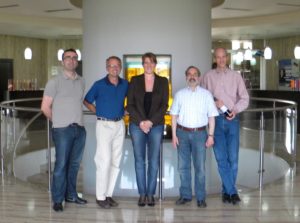
2009 trip to Montenegro to participate in an analysis of the judicial system for the US Department of State
LB: Interesting is a good place to start! So you obviously came back to the United States. At what point did you settle in San Diego?
GH: San Diego has been my home since 1978. I came here after law school. I went to LSU law school because I was trying to make the Louisiana home state thing work. Both my brother and sister were back there, and my dad was still alive and he was back there. I went to LSU law school and then became an assistant US attorney in Baton Rouge for two years.
Then I had a chance to move out here to San Diego. I came out and fell in love with the place, and am still in love with the place. That doesn’t mean I haven’t moved out, because I did do that a couple of times. In the 80s I tried private practice for three years, but it did nothing for me. So I came back to the office. Then in the ‘90s, an opening in San Francisco occurred. I lived up there for 4.5 years and actually became Chief of the Criminal Division in the US Attorney’s Office for a couple of years.
My last boss there was Robert Mueller which was quite interesting. It was very interesting getting to know him. I’d met him before during my career when he was in the Department of Justice. But he was my boss so I was in daily staff meetings with him. He was very intense, very smart, very reliable. I have a lot of respect for him. Then I came back to San Diego. I’ve been here at my house since 1984.
LB: So it’s definitely home. Perhaps that connection with San Diego might answer this question, but I’m wondering how you deal with the idea of impermanence. You have moved around a lot. Wondering in the back of your mind, is this it? How long am I here for? Should I establish roots and foundations? How do you counteract that with actually cultivating a life for yourself?
GH: It’s balanced. I have to say that growing up not having a home town, because I moved around all over the place, I liked the idea of having a home state and hometown, and a home. A structure that I could come back to. That doesn’t mean I want to just stay as a hermit here – I love getting out and seeing new things. If I, for instance, had the opportunity to be posted somewhere in the world during the next decade for another rule of law development period of time, I would jump at it. I like having this home base, and I love being invested in my hometown. I’m right on Balboa Park and besides being involved with the Diplomacy Council I’ve been involved with several non-profit boards in Balboa Park. I’m currently involved with a big project in Balboa Park. So I feel like I’m giving back to the community that I live in and care so much about.
LB: There really is nothing like building and surrounding yourself with a good community to make you feel like you belong in a place.
GH: Exactly. Particularly if you don’t have family around. You have to create it yourself. My family’s all back in Louisiana and we’re close, but this is home.
LB: I can relate to that! Making your own community around you based on what you want and where you want to be.
You did mention that if you had the opportunity to work on rule of law somewhere else then you would jump at it. Does anywhere come to mind as a place where you would absolutely love to work?
GH: You know, I’m not picky! I would go pretty much anywhere for the right kind of position. It’s probably unrealistic to think that anything is going to come along. I would go back to the Balkans in a second, I would go to the Baltic countries in a second, I would go to Belarus if anything opened up there, I would think about going to Ukraine. Then completely switching course, I wouldn’t be adverse to Myanmar posting or Cambodia. You name it, I would go there.
.
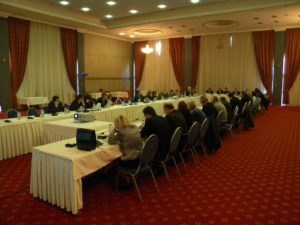
A two-month visit to Macedonia in 2010 to help train judges, prosecutors and defense attorneys on aspects of their new criminal procedure code
LB: Can you think of a time when you had an incredible experience, either while traveling or hosting visitors that made you sit back and wonder, ‘did that really just happen?’
GH: I think the moment that I’ve referred to already was when I was standing at that podium in the Bulgarian conference hall thinking that Khrushchev spoke from this podium. That was very impactful.
There are so many interactions with people overseas. Where I’ve experienced the great kindness of so many folks that I’ve met internationally and how that makes me feel like it’s so clear that we have so much in common. At our core, we’re interested in honesty, in kindness, in respect. If you give that, you get that in spades.
Some of the experiences I’ve had in Turkey, for instance, involved such generous people. I remember one of the last times I was in Istanbul, I reached out to a colleague of mine who had been a Turkish representative to the Seci center – they’re in Bucharest. He was not in Istanbul but I told him I was planning on visiting Çanakkale which is the site of Troy historically, on the Dardanelles. I’ve always been fascinated by Troy and I wanted to go.
I was doing the drive with a friend of mine who I’d met on a Lonely Planet walking tour of Istanbul.
My friend who had been a colleague said, ‘absolutely, you need to go down to Çanakkale. I know the head of the police in that town’.
So we drove down and met up with him. I thought we would just say hello. But we must have spent a day and a half together. I met his entire family, he took us to dinner. I thought after that, is this really happening?
LB: It feels like such a privilege when you meet strangers and they warmly welcome you in like you’ve known each other for years.
Once we are able to travel more again, where are you looking forward to going?
GH: Anywhere! Actually, I already have some trips in the planning stages. I’m probably going to go back to Europe next summer, down the Danube. I’ve spent a lot of time in Vienna and Budapest and I have very good friends in Vienna.
We’re probably going to wind up in Prague at some point. I have some Czech friends who I haven’t seen in years, so I’m looking forward to hooking up with them.
But when I think about where I would really like to go, off the beaten track, I do want to get to Myanmar, I want to get to parts of southeast Asia, I want to go to Laos. Thailand, I need to get outside of Bangkok.
I am a complete novice when it comes to Africa. I’ve been to the northern part of Africa but never to the rest of Africa. I’m ready for anywhere there.
LB: Sounds like we have the same bug – the more you travel, the more you want to see.
GH: Exactly. And you know where I’ve never been? Australia.
LB: Oh, you haven’t! Well, that’s a place I definitely recommend putting on your list. It’s a beautiful country.
.
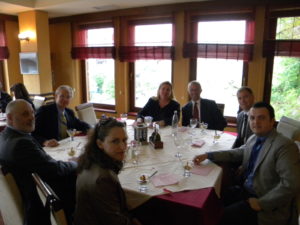
Kosovo in 2011 starting the drafting of a new criminal procedure code
LB: Can you think of an impactful message or lesson that one of our international visitors has shared with you that you’d like to pass on?
GH: When I first started my involvement with the Diplomacy Council I spoke a number of times to visiting law enforcement groups. The topic was usually the prosecution of Randy ‘Duke’ Cunningham. Randy Cunningham was a United States Congressman in San Diego who was caught up in bribery. It was investigated by my office and prosecuted by my office. In speaking with these representatives from other countries, they were always amazed that we were able to actually prosecute sitting congressmen. The fact of the matter is, even our President is not above the law, and certainly our congressional representatives are not above the law. In many, many countries, there is a legislative foreign executive community for prosecution of these political leaders.
Frequently, I would get the question from these delegations – how was it that the immunity was waived so that I could prosecute the congressman?
And I said, ‘they don’t have it here in the United States.’
They’d look at me like, ‘oh. Wow, is that ever different.’
We should respect the fact that we’ve got a system that doesn’t put anybody above the law, where most systems around the world don’t have that.
LB: It does often take that outsider perspective for you to realize your circumstances and realize, ‘Oh, you’re right. That’s actually a big positive that we’ve got.’
And my final question for you – how can we all become better global citizens and embody our role as citizen diplomats?
GH: Join the San Diego Diplomacy Council! Become a sustaining member! Because it is so easy to stay in touch with international friends, do it. Stay in touch with those folks. It’s the personal connections that will break down the xenophobia and racism that’s all too prevalent. Take advantage of these chances to connect with people from other countries, cultures, races, backgrounds, and enjoy the process of getting to know them. Just stay in touch, share your thoughts and your desires, and you’ll find, so frequently, that you’re absolutely in tune with the things that matter most. Honesty, integrity, kindness, openness.
Don’t talk politics or religion, but all that other stuff is good.
LB: I couldn’t agree more and I think that is the perfect note to end on. It’s been an absolute pleasure for me to talk to you, George. Thank you so much for sharing so much of your life with me, it’s been absolutely fascinating.



What a gift you have been to the Diplomacy Council George Hardy! Fascinated to learn you worked with Robert Mueller. And of your work with prosecuting Randy Cunningham. And on and on fascinating stories. I am green with envy of your time in Hawaii when things were less crowed there… Many thanks for all the good you have added to our world.